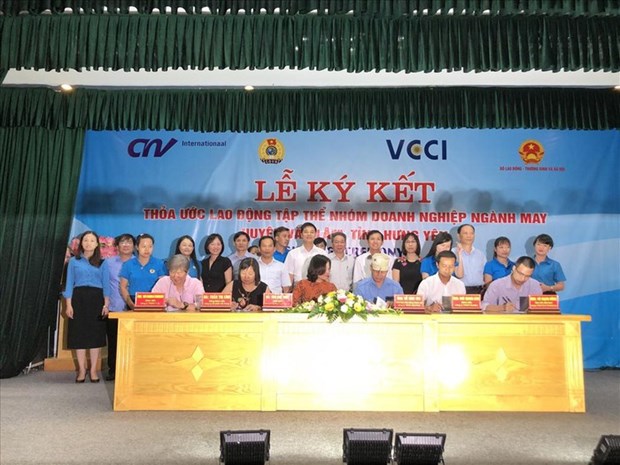Hung Yen: Five garment firms ink collective labour agreements
Five garment companies based in Van Lam district, the northern province of Hung Yen, signed collective labour agreements with their employees on July 14.
 Five garment companies based in Van Lam district, the northern province of Hung Yen, sign collective labour agreements with their employees on July 14. (Photo: daidoanket.vn)
Five garment companies based in Van Lam district, the northern province of Hung Yen, sign collective labour agreements with their employees on July 14. (Photo: daidoanket.vn)Hung Yen (VNA) – Five garment companies based in Van Lam district, the northern province of Hung Yen, signed collective labour agreements with their employees on July 14.
Ha Hung JSC, Viet Phat Co., Ltd., Suntex Co., Ltd., Nhat Hoa Production and Trade Co., Ltd., and Y&I Co., Ltd. and representatives of their workers inked the deals in an event hosted by the Vietnam General Confederation of Labour.
It was part of the project to promote effective negotiation in the textile and garment industry funded by the Dutch National Federation of Christian Trade Unions (CNV).
Under the agreements, the firms must reward at least one month’s salary as a bonus at the end of the year for those who work a full 12 months and give a bonus to those who come up with innovative ideas or high productivity. They must also provide clean and healthy meals, worth at least 16,000 VND per meal per person, for their employees.
Additionally, in each shift, the workers are allowed to have a short break of at least 10 minutes while the companies promised to take the workers on retreats.
For employees, they must abide by the provisions of law, labour contracts, workplace rules and the labour agreements. They also need to participate in employee recognition award programmes and must not unilaterally terminate labour contracts.
According to a Governmental official, to comply with the requirements of the Comprehensive and Progressive Agreement for Trans-Pacific Partnership (CPTPP) and EU-Vietnam Free Trade Agreement, Vietnam needs to respect and promote the 1998 International Labour Organisation (ILO) Declaration, particularly Convention 98 on the right to collective bargaining.
Currently, the country has more than 505,000 active businesses, employing 15 million workers.
By 2018, 27,000 businesses had signed collective bargaining agreements, accounting for 21 percent of firms with 10 employees or above, and 67 percent of businesses that have a union.
All public sector enterprises have signed collective bargaining agreements, while the figure in private sector and Foreign Direct Investment (FDI) is 66 percent.
A recent survey conducted by the Institute of Workers and Trade shows the wages of textile labourers are not high enough for them to afford living expenses.
About 65 per cent of the workers in the survey have to work extra time regularly. About 53 per cent cannot afford the cost of healthcare. –VNA













